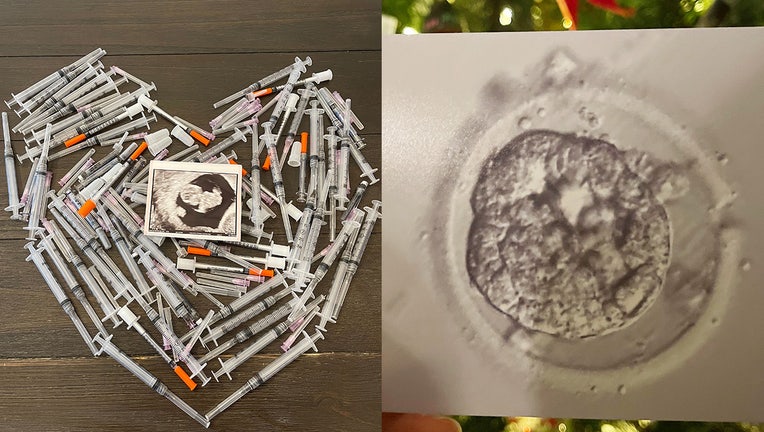The cost of IVF in 2024

Side-by-side images showing shots and embryo of Jinsol Madak Hwang's IVF journey. (Credit: Jinsol Madak Hwang)
In vitro fertilization, commonly referred to as IVF, is a complicated series of procedures that can sometimes help people who are struggling with infertility get pregnant.
What is IVF?
Simply put, IVF is the process of taking a human egg and fertilizing it outside the body until it develops into an embryo. Once that has been accomplished, it is transferred into a person’s uterus.
In the United States, 1 in 5 (19%) married women who are between the ages of 15 and 49 and have had no prior pregnancies are unable to conceive after one year of trying, according to the Centers for Disease Control and Prevention.
How much does IVF cost?
And, as many may guess, the procedure is not cheap.
On average, IVF treatments cost about $20,000 in the U.S., according to a Nerdwallet report, and that’s whether or not it is successful.
Costs vary depending on where you live
Jinsol Madak Hwang of Georgia said that since it is not a requirement for health insurance companies to cover IVF treatments in her state, she ended up paying $40,000 for a treatment package, she told FOX TV Stations.
The cost covered almost everything except for medications. The package also excluded other genetic testing which some parents opt to do just to see if their child will be at risk for certain diseases or genetic mutations that could be hereditary.
Hana Schoenherr of Michigan shopped around for IVF options and found that one of the cheaper choices was out of a clinic in New York at $13,500.
"Because I reside in Michigan, this was not an option for me," Schoenherr told FOX.
Schoenherr ended up paying $42,000 out of pocket for her IVF treatment and this included medications, egg retrieval and embryo transfers.
Chances of success
The chances of success of IVF depends on a woman’s age as well as what has caused her infertility to begin with, according to The International Fertility Group.
- Under 30 to 35 years of age: Chances of success is 55.6%
- Age 36-37: Chances of success is 40.8%
- Age 38-40: Chances of success is 26.8%
- Over 40: Chances of success is 7%
Keeping embryos frozen costs money too
While both Hwang and Schoenherr paid a hefty price for their IVF treatment, it does not include the yearly cost to keep additional embryos frozen for future pregnancies.
Hwang pays about $800 a year to keep her embryos frozen, she told FOX.
Schoenherr pays an additional $500 annually.
Is IVF covered by health insurance?
In many cases, IVF is not covered by insurance. Some companies elect to include some coverage of family planning health procedures but only a portion, not the whole thing.
There are 20 states that have laws requiring fertility treatments be fully or partially covered, according to The National Infertility Association. Fourteen of those states require coverage of IVF treatments.
For families who feel IVF is their best option but cannot afford the treatments and insurance does not cover it, there are grants and scholarships that can be used to help pay for IVF, according to the NFA’s website.
"Explore all financial options and understand that you may have to pay for more than you think. IVF is another step in this journey to find a cause and may not always be a solution. With that being said, I say go for it. I have friends who have had many unsuccessful transfers and finally were able to have a successful pregnancy. In the end, it is worth it no matter the cost," Schoenherr said.

